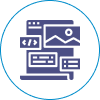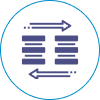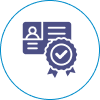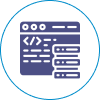Why Select ERP Software for Finance and Accounting?
The fundamental tasks needed to oversee the financial side of healthcare practices are gathered together in an accounting and finance ERP (Electronic Health Record) software. It simplifies financial processes with integrated capabilities for spending tracking, billing, and invoicing. By doing away with the requirement for distinct systems, this integration lowers errors and boosts productivity. Healthcare providers may easily create reliable financial reports, which helps with financial management and decision-making.
1. Regulatory and Compliance Needs:
Accounting and finance ERP software is made to meet the stringent legal requirements and industry-specific compliance standards. These systems have capabilities that make it easier to comply with laws like ICD-10 (International Classification of Diseases, Tenth Revision) and HIPAA (Health Insurance Portability and Accountability Act).
Healthcare organisations may protect sensitive financial data and guarantee compliance with data privacy rules by utilising integrated security measures and audit trails. By reducing the possibility of regulatory infractions, automated compliance checks assist save money on fines and legal ramifications.
Moreover, healthcare providers can feel secure knowing that their accounting and finance ERP software is updated frequently to accommodate changing regulatory environments.
2. Clinical Systems Integration:
Accounting and finance ERP software and clinical systems interface with ease, resulting in a single platform for handling patient and financial data. By removing departmental walls between clinical and administrative functions, this integration promotes teamwork and improves data accuracy.
Transparent communication between carers and billing specialists is made possible by healthcare professionals' direct access to patient billing information from electronic health records. By ensuring that financial records accurately reflect the most recent patient contacts and treatments, real-time data synchronisation helps to minimise inefficiencies in the revenue cycle and billing errors.
Moreover, healthcare companies may provide thorough financial reports that link to clinical outcomes thanks to integrated finance and accounting ERP software, which facilitates data-driven decision-making and strategic planning.

3. Customisation and Scalability:
Accounting and finance Scalability and customisation options are provided by ERP software to meet the specific requirements and growth paths of healthcare providers. Organisations having control over small clinics or sizable hospital networks might customise ERP systems to meet their own financial workflows and reporting needs.
These systems provide long-term viability and adaptation in a changing healthcare environment by facilitating the seamless addition of new modules and capabilities as organisational demands change. Users may easily analyse financial data and generate actionable insights to drive corporate performance using customisable dashboards and reporting tools.
Furthermore, healthcare organisations can grow without upsetting current workflows or jeopardising data integrity thanks to scalable finance and accounting ERP software, which lays the groundwork for long-term success and expansion.
In conclusion, healthcare organisations can reap a host of advantages from finance and accounting ERP software, such as streamlined financial operations, regulatory compliance, clinical system connection, and scalability/customization choices.
4. Enhanced Revenue Cycle Management:
Accounting and finance ERP software is essential to healthcare organisations' efforts to maximise revenue cycle management (RCM) procedures. By automating processes like tracking reimbursements, managing denials, and processing claims, these systems reduce revenue leakage and quicken cash flow.
The time between providing services and getting paid is shortened by the finance and accounting ERP software's features, which include electronic claim submission and real-time eligibility verification. Accurate billing is ensured by automated coding and charge capture features, which lower the possibility of coding errors and denied claims.
Additionally, healthcare providers can spot trends, patterns, and possible revenue cycle bottlenecks thanks to sophisticated analytics capabilities integrated into finance and accounting ERP software. Organisations can optimise revenue production and reduce financial risks by implementing focused strategies based on insights gained about payer mix, reimbursement trends, and revenue sources.
5. Improved Decision Assistance:
Accounting and finance Healthcare executives may make well-informed financial decisions based on up-to-date information and practical insights thanks to the comprehensive decision support features provided by ERP software. Stakeholders may track key performance indicators (KPIs), examine trends, and project future financial results thanks to these systems' complete financial insight.
Finance and accounting ERP software allows users to track financial parameters including revenue, expenses, profitability, and accounts receivable in a centralised and user-friendly interface with customisable dashboards and reporting tools. By enabling proactive decision-making and strategic planning, this financial performance transparency ensures sustainable growth and profitability.
Additionally, predictive analytics and modelling features are frequently included in finance and accounting ERP software, which enables businesses to run numerous scenarios and evaluate how strategic efforts might affect financial results. Healthcare providers can maximise financial performance in an unpredictable environment by optimising resource allocation and mitigating risks through the use of scenario analysis and sensitivity testing.
6. Improved Patient Experience:
Accounting and finance ERP software streamlines billing and payment procedures, lessens administrative workloads, and enhances financial transactions' transparency, all of which lead to better patient experiences. With the use of these technologies, healthcare professionals may produce patient statements that are factual and comprehensible, outlining costs and insurance coverage.
Finance and accounting ERP software improves patient comfort by providing a variety of payment methods, such as electronic funds transfer (EFT) and online portals, enabling patients to settle invoices quickly and securely. Additionally, open communication about financial obligations promotes patient satisfaction and confidence, which strengthens the bond between patients and providers.
Furthermore, proactive financial counselling and assistance is made possible by finance and accounting ERP software, which aids patients in navigating insurance complications, comprehending healthcare expenses, and investigating opportunities for financial assistance. These solutions encourage financial awareness and involvement by giving patients the power to make wise financial decisions about their healthcare, which eventually enhances the patient experience as a whole.
To summarise, electronic health record software for finance and accounting provides healthcare organisations with numerous advantages such as better revenue cycle management, better decision support, and better patient experiences. Healthcare providers can ensure financial sustainability and regulatory compliance, drive strategic expansion, optimise financial operations, and provide high-quality care by utilising these cutting-edge technology.
7. Confidentiality and Data Security:
Accounting and finance ERP software places a high priority on data security and confidentiality, preserving patient privacy and sensitive financial information. To stop illegal access to financial records and private health information, these systems use sophisticated encryption techniques and strict access controls.
Role-based permissions can be set up by healthcare organisations to limit access to confidential financial information, making sure that only individuals with the proper authorization can read or alter financial records. An extensive record of user interactions with financial data is provided via audit trails and activity logs, which enbles organisations to track and monitor access for security and compliance needs.
Furthermore, to ensure compliance with industry standards and laws like HIPAA and PCI DSS (Payment Card Industry Data Security Standard), finance and accounting ERP software is subject to frequent security audits and compliance evaluations. Strict security guidelines and best practices are followed by these systems to reduce the possibility of data breaches and safeguard the confidentiality and integrity of financial data.
8. Optimal Use of Resources:
Accounting and finance ERP software streamlines workflows, reduces manual interventions, and automates repetitive operations to maximise resource utilisation in healthcare organisations. Staff members may concentrate their time and skills on value-added tasks like patient engagement programmes, revenue optimisation, and strategic financial planning thanks to these platforms.
Finance and accounting ERP software reduces administrative costs and eliminates inefficiencies in financial processes with capabilities including automated invoice generation, electronic payment processing, and predictive analytics. Businesses can save money and run more efficiently by standardising operations and automating repetitive tasks.
Furthermore, by offering real-time access into financial performance and resource utilisation data, finance and accounting ERP software helps with resource allocation decisions. In order to support organisational targets and objectives, healthcare leaders can spot areas of overspending or underutilization, optimise resource allocation, and strategically deploy funds.
9. Ongoing Innovation and Improvement:
Accounting and finance ERP software gives healthcare organisations access to state-of-the-art technologies and best-in-class financial management tools, which promotes a culture of innovation and continuous development. To include new features, handle growing difficulties, and take advantage of technology breakthroughs, these systems undergo continuous updates and enhancements.
Healthcare providers may maximise the potential of finance and accounting ERP software to generate operational excellence and competitive advantage by keeping up with industry trends and advancements. Organisations can take advantage of these developments to maximise financial performance and provide value to stakeholders by deploying blockchain technology for safe transactions or embracing artificial intelligence (AI) for predictive analytics.
Moreover, user input and collaboration are frequently provided by finance and accounting ERP software, giving organisations the chance to influence future improvements and participate to product development. Healthcare providers should guarantee that finance and accounting ERP software continues to fulfil their shifting needs and expectations by actively engaging with software manufacturers and participating in user groups. This will also help to influence the direction of product development.
In summary, healthcare organisations can reap several advantages from finance and accounting ERP software, such as secure and private data, effective use of resources, and chances for ongoing innovation and development. In an increasingly complicated and competitive healthcare sector, healthcare providers may optimise financial operations, drive strategic growth, and provide high-quality care by utilising these cutting-edge technology.
Related Services
Our Comprehensive Development Process
Navigating the complexity of finance and accounting in the dynamic healthcare industry, where fiscal management is critical to organisational performance, calls for a strategic strategy that is customised to each institution's specific demands. At BM coder, we are aware of how critical effective financial management is to boosting operational effectiveness, guaranteeing legal compliance, and promoting strategic expansion in the healthcare industry.
1. Knowing What You Need
Our development process began with a thorough grasp of the financial ecosystem that surrounds your company. We try to uncover the subtleties of your financial environment by means of in-depth discussions with important stakeholders, pinpointing areas of discomfort, current inefficiencies, and areas that you would like to see improved. We are able to precisely customise our solutions and make sure they meet your unique needs by closely coordinating with your goals and issues.
2. Interface and Personalisation
Understanding that healthcare organisations are inherently diverse, we provide scalable finance and accounting solutions that work in unison with your current systems and procedures. Our software is designed to fit the specific shapes of any organisation, no matter how big or little. It can easily adjust to changes in organisation size, structure, and strategic goals.
3. Security and Compliance
Compliance and security are critical in an industry governed by strict regulatory requirements and data privacy imperatives. Our accounting and financial solutions are painstakingly designed to comply with industry standards, including ICD-10 (International Classification of Diseases, Tenth Revision) and HIPAA (Health Insurance Portability and Accountability Act). By putting strong security measures in place that include encryption, access limits, and audit trails, we protect the confidentiality of sensitive financial information and guarantee unwavering adherence to current privacy regulations.
4. Simplified Procedures
Our software solutions are designed with efficiency in mind, with the goal of eliminating manual inefficiencies and streamlining financial processes. Our solutions automate time-consuming procedures, reducing errors and freeing up vital time for your personnel. These duties range from billing and invoicing to revenue cycle management and reporting. Through workflow optimisation and real-time information provision, we free up your employees to focus on providing exceptional patient care while also improving financial performance.
5. Growth and Scalability
Your financial management demands will inevitably change as your business starts its journey of development and growth. Because our solutions are designed to be scalable, you have the flexibility to expand without affecting the regularity of your business operations. Our software scales well with your business, providing the necessary flexibility and agility to manage the challenges of growth, whether you are about to establish new locations, diversify your offerings, or enter untapped markets.
6. Ongoing Assistance and Creativity
We are dedicated to your success not just in terms of implementation but also in terms of continuous support, innovation, and training. We are steadfast partners in your quest for excellence, offering customised training programmes and round-the-clock support to guarantee the continuous effectiveness and efficiency of your accounting and financial processes. To ensure that you stay ahead of the curve in a constantly changing environment, we also continue to be at the forefront of innovation, always improving and refining our software solutions to incorporate the newest technology and industry best practices.
7. Result
In conclusion, strong financial management is essential to healthcare organisations' success in a changing and cutthroat market. Through the thorough development process of [Your Company Name], you can access a range of solutions designed to optimise workflows, guarantee compliance, and drive strategic expansion. Our adaptable solutions, supported by ongoing innovation and support, enable you to achieve your financial goals while providing unmatched patient care. Join us as we set out on a revolutionary journey, and together, let's pave the way for your organization's financial future to be healthy.

Exploring Diverse Types of Finance and Accounting Software
It is impossible to overestimate the importance of technology in finance and accounting in the quickly changing business environment of today. Accounting and finance software solutions are essential for promoting accuracy, efficiency, and strategic decision-making for companies of all kinds, from handling intricate financial transactions to guaranteeing regulatory compliance.
1. Enterprise Resource Planning (ERP) Systems
erp development company india accounting, finance, and human resources among other departments inside an organisation. They promote smooth data flow between many departments and offer a centralised database.
2. Tax Management Software
Tax management software computes tax liabilities, automates tax compliance procedures, and guarantees compliance with tax laws. These technologies stay current with shifting tax regulations and minimise errors in tax strategy.
3. Expense Management Software
The utilisation of expense management software streamlines the process of monitoring, authorising, and compensating staff members for their expenses. These solutions enforce policy compliance, increase transparency, and simplify the reporting of expenses.
4. Financial Reporting Software
This type of software creates specialised reports for stakeholders by combining financial data from several sources. These tools make it easier to comply with regulations and improve insight into key performance indicators (KPIs).
5. Billing and Invoicing Software
This type of software tracks payments, handles customer accounts receivable, and automates the invoicing process.
6. Audit Software
Auditors can plan, carry out, and record audit operations with the use of audit software. To guarantee compliance and the accuracy of financial data, these technologies make risk assessment, internal control review, and audit trail analysis easier.
7. Financial Risk Management Software
This type of software assists businesses in recognising, evaluating, and reducing a range of financial risks, including market, operational, and credit risk. These instruments make use of cutting-edge modelling and analytics methods to measure and control risk exposure.
8. Financial Solutions Based on Blockchain
Because blockchain technology offers safe, open, and unchangeable record-keeping, the banking and accounting industries are adopting it at an increasing rate. Benefits of blockchain-based solutions include improved fraud protection, real-time transaction visibility, and expedited reconciliation procedures.


































